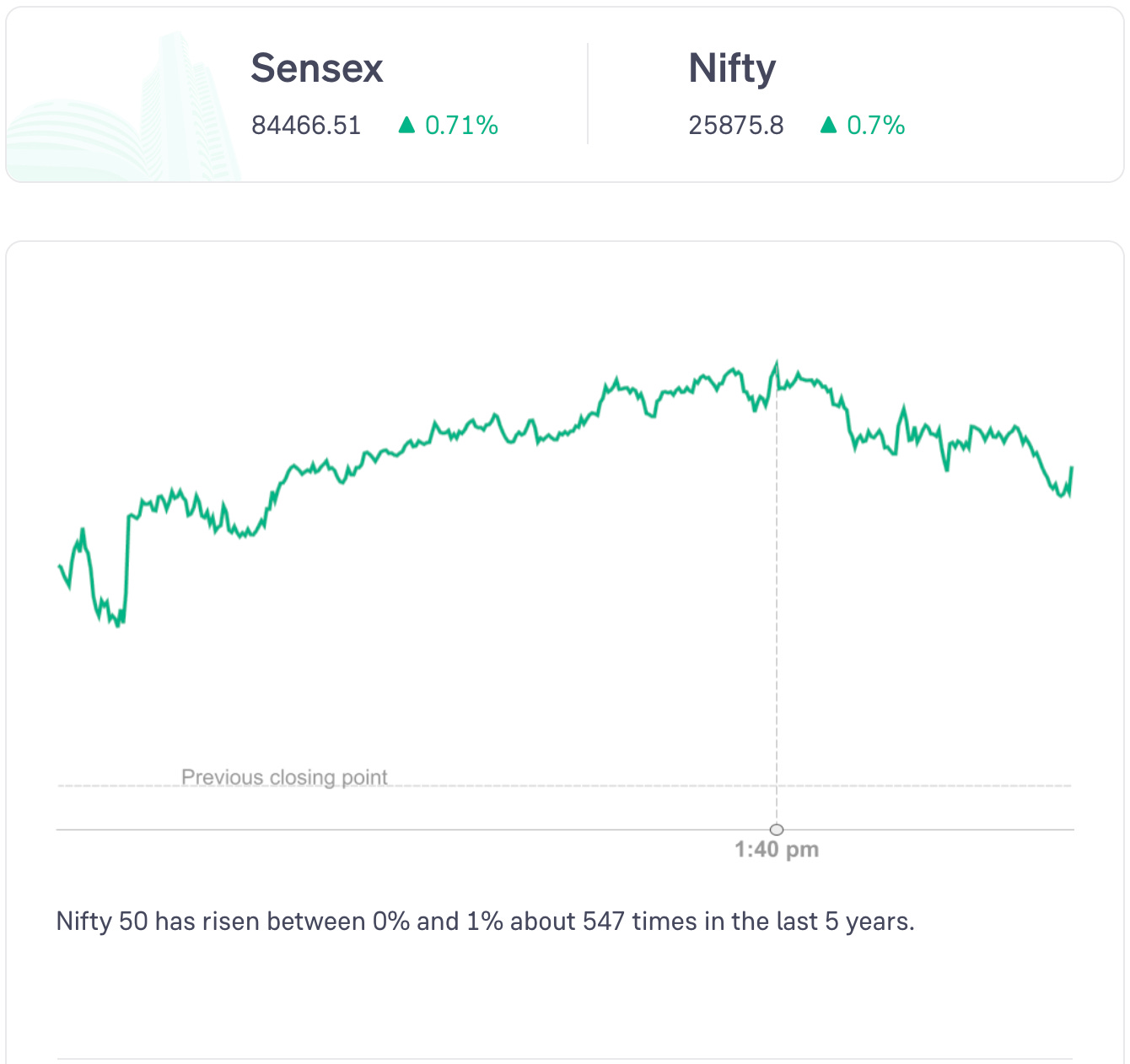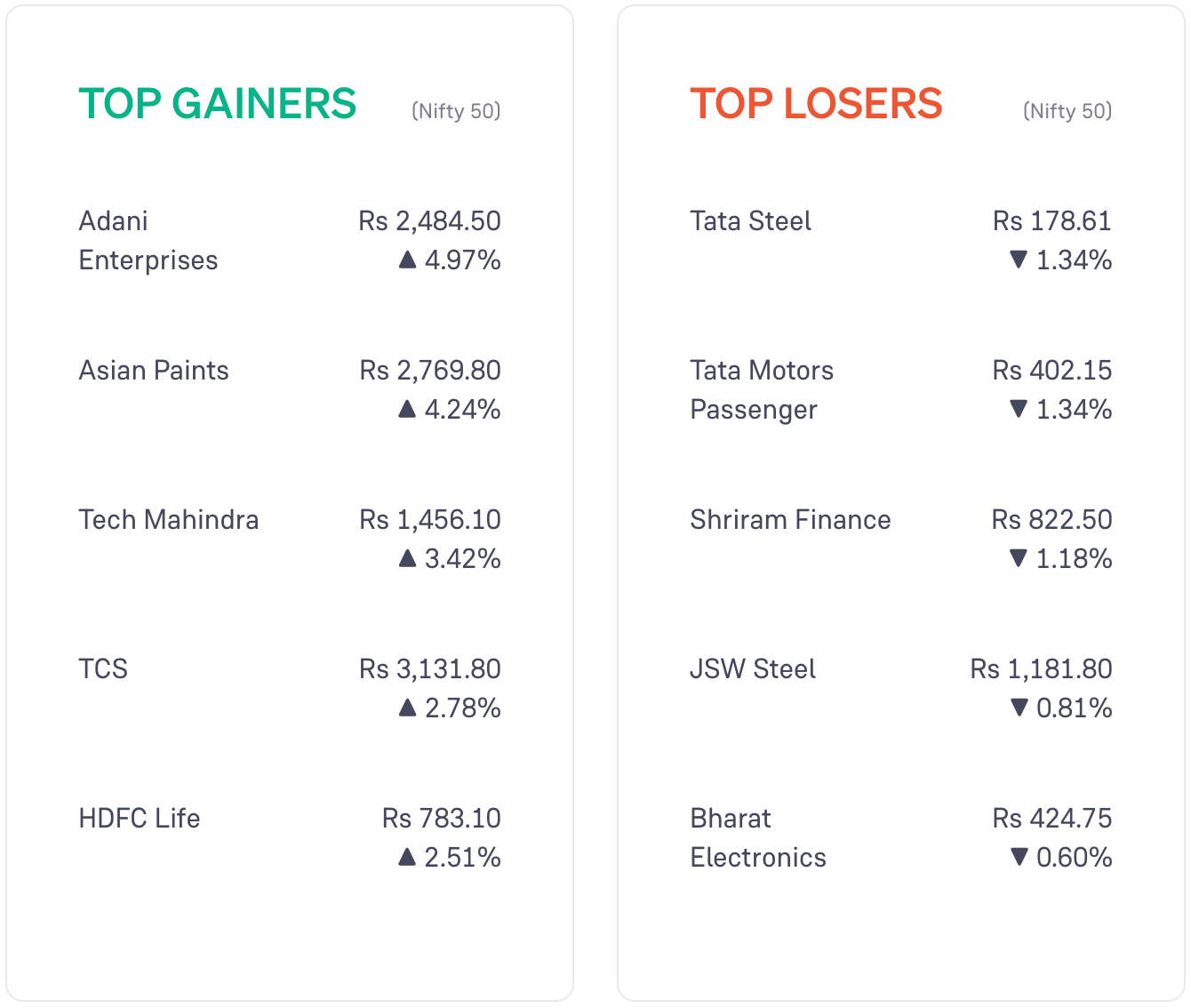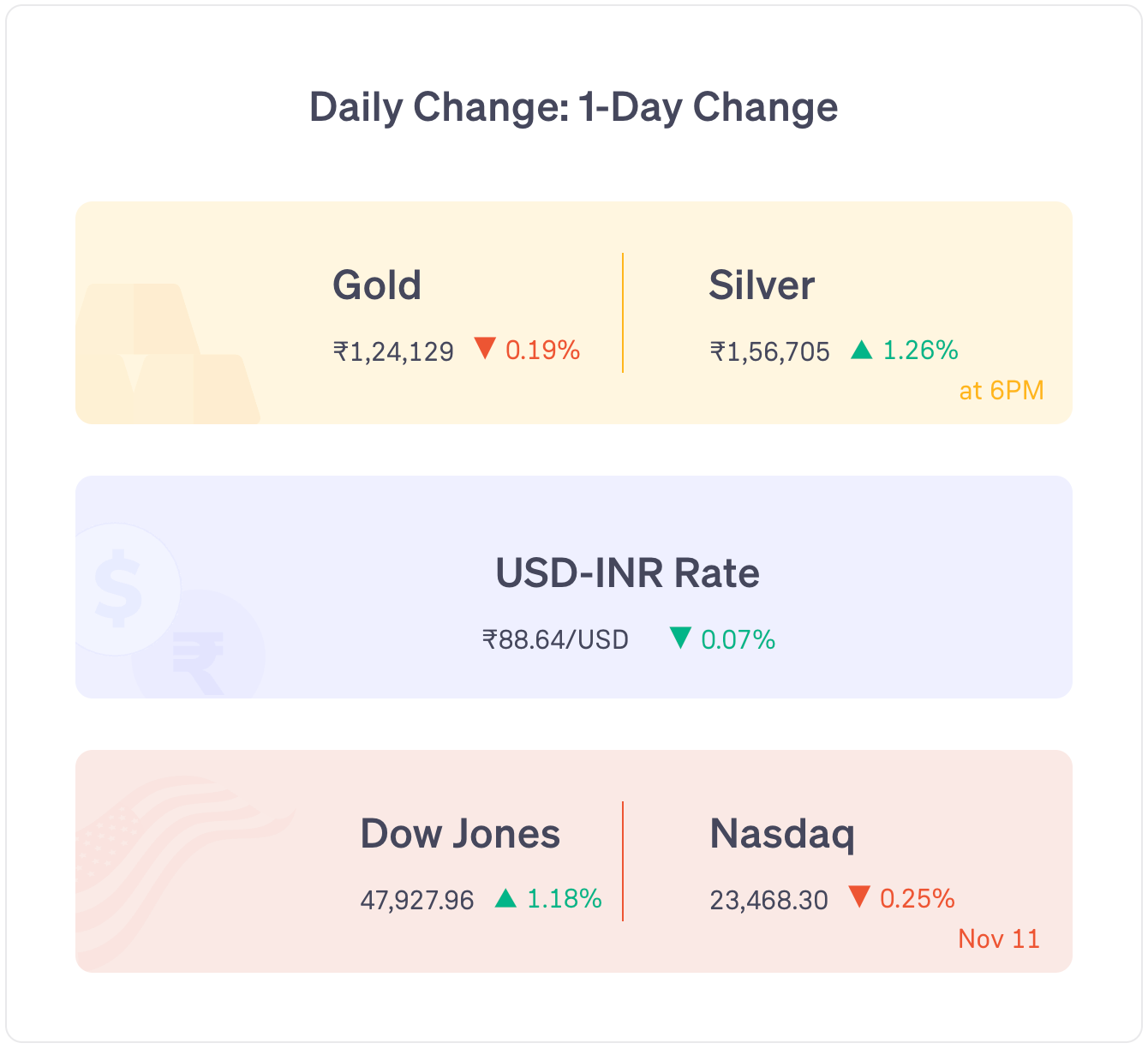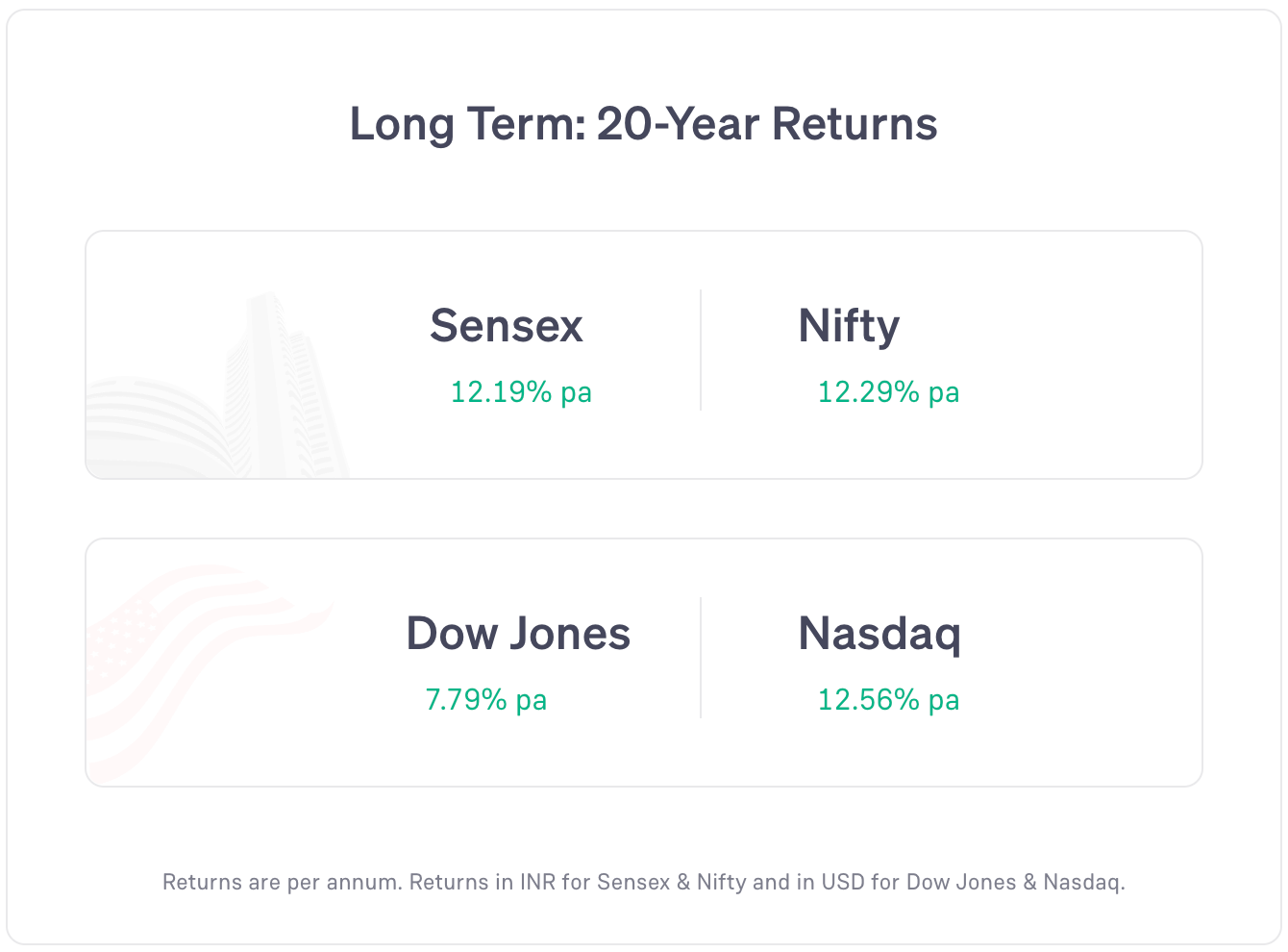Fall in inflation rate, Asian Paints profits up 43%, & more - Groww Digest
Wednesday, 12 November 2025
Markets opened above yesterday’s closing point.
Nifty 50 opened higher, stayed in a range and closed in the green. The rise may have been driven by positive global sentiments due to hopes of an India-US trade deal and expectations that the US government shutdown will be over soon.
IT stocks and auto stocks rose the most today. Realty stocks and metal stocks fell the most.
Global markets: Most US markets and most Asian markets rose. European markets rose (as of 6 pm IST).
News
India’s retail inflation fell to 0.25% year-on-year in Oct (vs 1.44% in Sept).
A SEBI panel proposed new rules on conflict of interest and disclosures for its members and officials, including sharing asset details, recording recusals, and following tougher trading and gift norms.
PhysicsWallah IPO has been subscribed 0.13 times. Retail subscription: 0.58 times. IPO closes on 13 Nov.
Emmvee Photovoltaic IPO has been subscribed 0.17 times. Retail subscription: 0.61 times. IPO closes on 13 Nov.
Tenneco Clean Air IPO has been subscribed 0.42 times. Retail subscription: 0.36 times. IPO closes on 14 Nov.
Groww IPO listed on the stock exchanges at a premium of 12% over the issue price and closed 31.33% up at the end of the day#
Stocks Updates
Hindustan Aeronautics: net profit rose 10% year-on-year to Rs 1,669 crore in the July-Sept quarter.
Asian Paints: net profit rose 43% year-on-year to Rs 994 crore in the July-Sept quarter. Dividend declared: Rs 4.5 per share; record date: 18 Nov. The company also delayed its Rs 2,000 crore Madhya Pradesh plant launch to within 3 years of getting environmental clearance.
Info Edge (Naukri): net profit rose 1,260% year-on-year to Rs 316 crore in the July-Sept quarter. Dividend declared: Rs 2.4 per share; record date: 21 Nov.
Ashok Leyland: net profit rose 7% year-on-year to Rs 756 crore in the July-Sept quarter. Dividend declared: Rs 1 per share; record date: 18 Nov.
Grasim Industries: began commercial production at its Kharagpur (West Bengal) paint plant’s resin block with a 24 MLPA capacity.
Lupin: inaugurated a new oncology manufacturing block at its Vizag facility to expand global CDMO (Contract Development and Manufacturing Organization) capabilities.
Word of the Day
Inflation Targeting
It is a strategy used by central banks to maintain a specific inflation rate goal
Central banks use different tools like interest rates to control inflation.
The goal is to maintain price stability, so people and businesses can plan and spend with confidence. For this, central banks announce the target publicly.
Most central banks set a target range, to allow some flexibility in response to economic shocks.
Example: RBI has set India’s inflation target at 4% with a tolerance band of ± 2%.
6 Day Course
Theme: bonds
Day 3: Wednesday
Companies can raise money by issuing fresh stocks during an IPO.
After an IPO, the stocks are free to trade in the stock markets (stock exchanges).
Similarly, new bonds are introduced in the primary markets. This is called a public issue of a bond.
In this, the bond issuer introduces a bond and invites investment. Money raised in this process is collected by the bond issuer.
Example: XYZ corporation is raising Rs 2,000 crore by issuing bonds that have a maturity period of 5 years and offers a coupon rate (interest) of 9% per annum.
Once a bond is issued, it can be traded in the secondary markets — similar to how any stock can be traded on the stock markets after its IPO is done.
When a bond is bought/sold in the secondary market, the money is exchanged between the buyer and seller only, not the bond issuer.
Trading of a bond allows investors to sell their bond much before the maturity period of the bond.
Featured Question
“If one invests Rs 50,000 in an equity mutual fund. After 1 year if the same person invests Rs 50,000 in the same equity mutual fund. Now the total amount invested becomes 1,00,000. Six months thereafter if the person sells mutual fund units worth Rs 50,000. In this situation will the amount be taxed as LTCG from the former investment or STCG of the later investment.”
This question arises every time a person is making multiple investments in the same mutual funds.
Monthly SIPs are also an example of this — multiple investments in the same mutual fund.
In such cases, investors must remember that the oldest mutual fund units are sold first.
This way, tax can be minimised in case of equity mutual funds.
Example:
Let’s say you invested Rs 1 lakh in 2021. And then, another Rs 1 lakh in 2023.
And, in 2025, you want to withdraw Rs 75,000.
So, the oldest units will be sold by default (the units that were bought in 2021).
This is done because equity mutual funds’ tax rates.
They are taxed at 20% of the gains, if investing and withdrawing within 1 year.
But if an investor invests and withdraws with a gap of more than 1 year, the tax rate is lower — 12.5% of the gains.
Also, the first Rs 1.25 lakh gains from equity (equity mutual funds and shares) are tax-free every financial year.
So, it makes sense to sell older mutual fund units first. They will attract lower taxes.
If the total equity gains are below Rs 1.25 lakhs in a financial year, you will have to pay no tax.
Did you like this edition?
Leave a feedback here!





